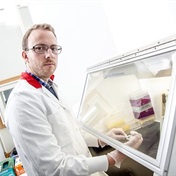Scientists say they've mapped the entire genomes of 91 sperm from one man, the first time such gene mapping has been done in a human gamete (sperm or egg cell).
The research gives a glimpse into recombination - the process by which DNA mixes to create offspring that carry with them traits from parents and grandparents, the Stanford University scientists explained.
"We were able to generate an individual recombination map and mutation rate for each of several sperm from one person," study co-author Barry Behr, director of Stanford's in vitro fertilisation laboratory, said. "Now we can look at a particular individual, make some calls about what they would likely contribute genetically to an embryo, and perhaps even diagnose or detect potential problems."
The findings were published in the journal Cell.
How the study was done
Until now, scientists had only been able look to population-wide studies to try and gauge how often recombination happened in sperm and eggs cells, and how complicated the process might be, the Stanford team stated.
The new study focused on the sperm of a healthy 40-year-old man who had normal sperm and had already fathered healthy offspring. The study found that prior population studies were fairly accurate in assessing rates of recombination.
The team reported that, as expected, the man's sperm each had undergone about 23 recombinations of DNA, although there were wide variations in this genetic mixing between individual sperm. Two of the sperm sampled were missing entire chromosomes, the authors pointed out.
Between 25 and 36 "new single nucleotide mutations" were also spotted - random mutations that can affect offspring for good or ill.
"The exact sites, frequency and degree of this genetic mixing process is unique for each sperm and egg cell," study senior author Stephen Quake, a professor of engineering, bioengineering and applied physics at Stanford, said. "We've never before been able to see it with this level of detail. It's very interesting that what happens in one person's body mirrors the population average."
The findings have implications for research into fertility, because when things go wrong with recombination, sperm can cease to be viable, the researchers noted.
"This could serve as a new kind of early-detection system for men who may have reproductive problems," said Behr, who is also a co-director of Stanford's reproductive endocrinology and infertility program. "It's also possible that we could one day use other, correlating features to harmlessly identify healthy sperm for use in IVF. In the end, the DNA is the raw material that ultimately defines a sperm's potential. If we can learn more about this process, we can better understand human fertility."
Read more:
Gene therapy- what you should know
More information
The American Academy of Family Physicians has more about male infertility.
(Copyright © 2012 HealthDay. All rights reserved.)




 Publications
Publications
 Partners
Partners















